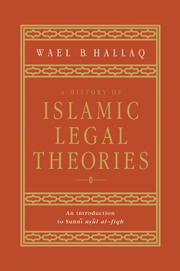2 - The articulation of legal theory: I
Published online by Cambridge University Press: 05 October 2013
Summary
INTRODUCTION
one of the central problems associated with the history of Islamic legal theory is the marked absence of works written not only in the third/ninth century but also in the fourth/tenth. As we have seen, the lack of literature from the third/ninth century is causally connected with the very development of legal theory, which was to emerge only as late as a century after Shāfiʿī's death. But the fact that we have virtually no works from the following century is not so much to be associated with the development of legal theory as with the sheer historical fact – or accident – that such works have simply failed to reach us. Those works that have succeeded in surviving the ravages of time are either incomplete or so compressed that it is virtually impossible to draw from them an adequate picture which might represent the state of development of theory in the fourth/tenth century. An account of this development must thus await the publication of several key works written by the chief theorists of the time.
The earliest period from which we have an extensive record is the fifth/eleventh century, which can claim a special status in the field of legal theory for more than one reason. First, this century is associated with a stage in which the major problems of legal theory were addressed, thus paving the grounds for subsequent, finer analyses.
- Type
- Chapter
- Information
- A History of Islamic Legal TheoriesAn Introduction to Sunni Usul al-fiqh, pp. 36 - 81Publisher: Cambridge University PressPrint publication year: 1997



